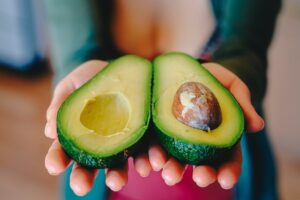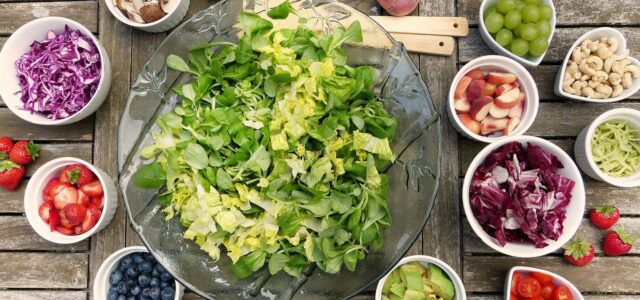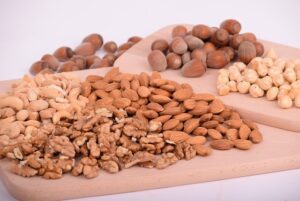Healthy Eating Tips for Managing Type 2 Diabetes, Experts Explained

Diagnosed with type 2 diabetes? Don’t panic. This is a chronic disease that affects millions of people around the world. With the right treatment, you can live a long and healthy life. In fact, many people with diabetes manage their condition without any medication by adopting a healthy lifestyle. Speaking of a healthy lifestyle, diet plays a key role in diabetes management. Certain foods can raise blood sugar levels, while others may help lower it. Additionally, you need to watch your portions and avoid overeating. Basically, what you eat and how much you eat have a major, direct impact on your blood sugar levels. So read on to learn our best healthy eating tips for managing type 2 diabetes.
Focus on Fiber
 In a journey to living your life to the fullest with type 2 diabetes, fiber is your best friend. Not only does it help regulate blood sugar levels, but it also promotes gut health and keeps you feeling full longer. Eating more fiber-rich foods can make a tremendous impact on your overall well-being. Organic fruits, veggies, whole grains, nuts, and protein-rich seeds are excellent sources of fiber that should be staples in your daily meals. Start your day with a hearty bowl of oatmeal topped with fresh berries or snack on crunchy carrots and hummus for a fiber boost.
In a journey to living your life to the fullest with type 2 diabetes, fiber is your best friend. Not only does it help regulate blood sugar levels, but it also promotes gut health and keeps you feeling full longer. Eating more fiber-rich foods can make a tremendous impact on your overall well-being. Organic fruits, veggies, whole grains, nuts, and protein-rich seeds are excellent sources of fiber that should be staples in your daily meals. Start your day with a hearty bowl of oatmeal topped with fresh berries or snack on crunchy carrots and hummus for a fiber boost.
Control Your Carb Intake
Controlling your carb intake is also a game changer. Carbs can directly impact blood sugar levels, so being mindful of the amount and type of carbs you consume is important. So try switching to complex carbohydrates like whole grains, red rice, and stevia, rather than simple sugars found in processed foods. These complex carbs will be digested more slowly by your body, causing a gradual rise in blood sugar levels.

Get More Lean Protein
Lean protein sources like skinless poultry, fish, tofu, and legumes not only help you feel full longer but also keep your blood sugar levels stable. Protein plays a crucial role in regulating insulin and glucose metabolism in the body. By including more lean protein in your meals and snacks, you can better manage your diabetes while supporting overall health. Try swapping out processed meats for leaner options like grilled chicken or baked fish. These choices are lower in unhealthy fats and provide essential nutrients with no risk of triggering spikes in blood sugar levels.
Choose Heart-Healthy Fats
 Last but not least, you might want to switch to heart-healthy fats from trans fats. Let me explain. Healthy fats are real, and they can help improve cholesterol levels and prevent heart disease. Opt for sources like avocados, nuts, seeds, and olive oil to incorporate these beneficial fats into your diet. Avocados are not only delicious but also packed with monounsaturated fats that can support heart health. Nuts and seeds are great snacks that provide essential nutrients along with healthy fats.
Last but not least, you might want to switch to heart-healthy fats from trans fats. Let me explain. Healthy fats are real, and they can help improve cholesterol levels and prevent heart disease. Opt for sources like avocados, nuts, seeds, and olive oil to incorporate these beneficial fats into your diet. Avocados are not only delicious but also packed with monounsaturated fats that can support heart health. Nuts and seeds are great snacks that provide essential nutrients along with healthy fats.
You see, small changes can often lead to big results when it comes to your health. Consult with healthcare professionals or dietitians for personalized advice tailored to your needs. Here’s to embracing a healthier diet and a healthier you.
…


 Also known as the ‘memory tree,’ Ginkgo Biloba is widely used as a natural supplement for improving brain function. It helps improve memory and concentration, enhance oxygen supply to the brain, reduce stress levels, and protect against age-related mental decline. Adding this powerful herb to your diet can help you stay sharper and more focused throughout the day. Research has also shown that ginkgo can reduce age-related cognitive decline and even help reduce symptoms of dementia.
Also known as the ‘memory tree,’ Ginkgo Biloba is widely used as a natural supplement for improving brain function. It helps improve memory and concentration, enhance oxygen supply to the brain, reduce stress levels, and protect against age-related mental decline. Adding this powerful herb to your diet can help you stay sharper and more focused throughout the day. Research has also shown that ginkgo can reduce age-related cognitive decline and even help reduce symptoms of dementia. Last but not least, dark leafy greens are packed with essential vitamins, minerals, and antioxidants. A diet full of spinach, kale, collard greens, and other dark leafy vegetables can help improve overall brain health while reducing the risk of age-related cognitive decline. They are also a great source of B vitamins which can help reduce stress and anxiety levels. Experts from Harvard Health have also found that eating dark leafy greens can reduce the risk of stroke by up to 25 percent.
Last but not least, dark leafy greens are packed with essential vitamins, minerals, and antioxidants. A diet full of spinach, kale, collard greens, and other dark leafy vegetables can help improve overall brain health while reducing the risk of age-related cognitive decline. They are also a great source of B vitamins which can help reduce stress and anxiety levels. Experts from Harvard Health have also found that eating dark leafy greens can reduce the risk of stroke by up to 25 percent.

